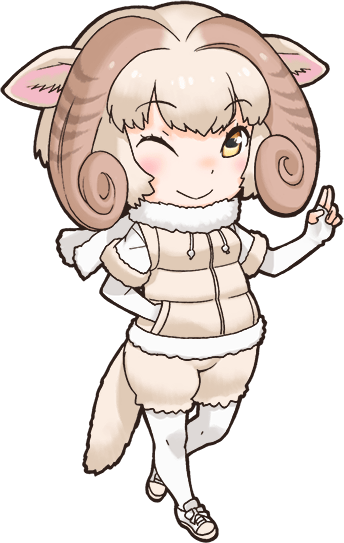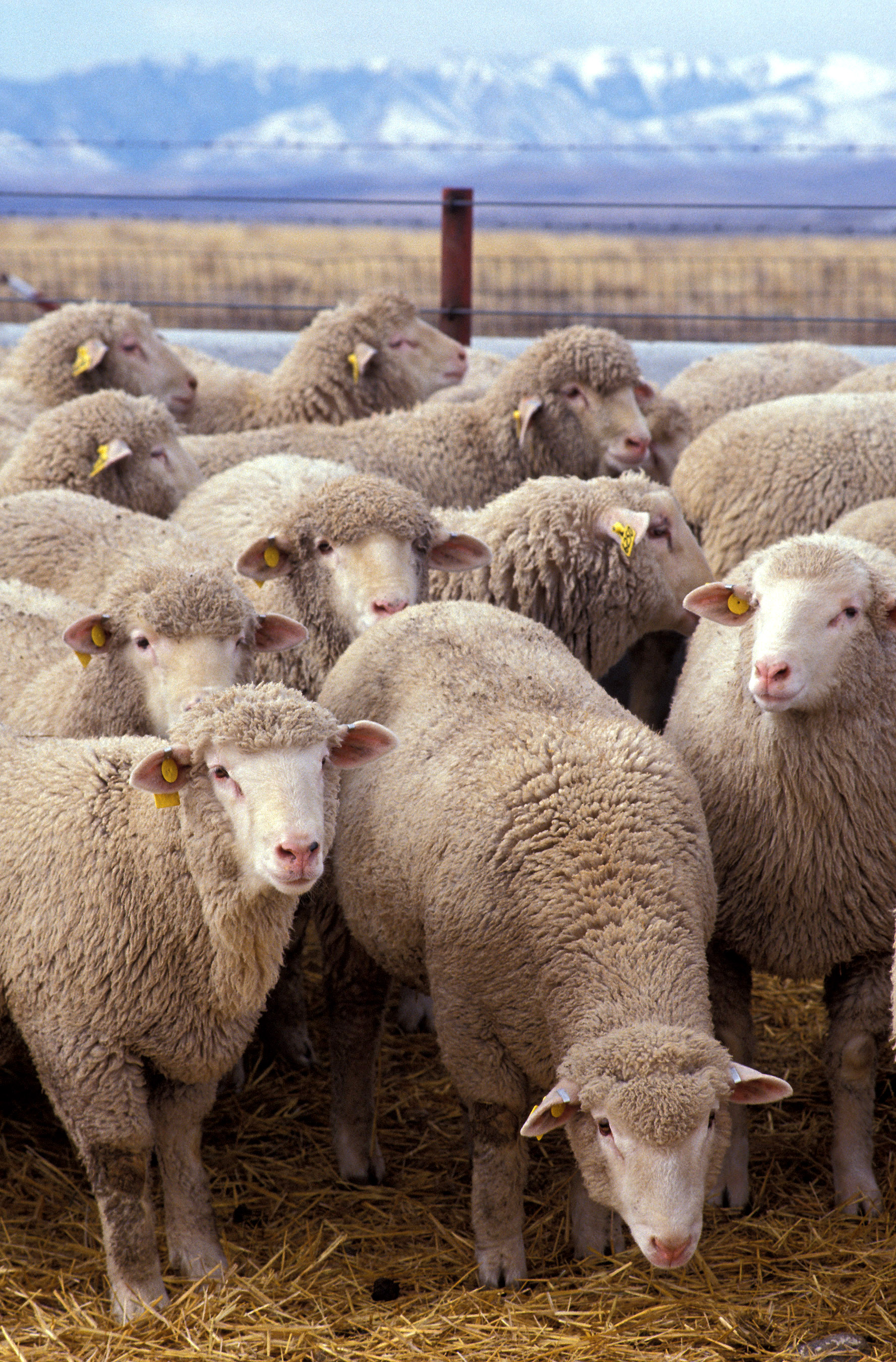Sheep: Difference between revisions
No edit summary |
KenjiDraco (talk | contribs) No edit summary |
||
| (7 intermediate revisions by 5 users not shown) | |||
| Line 1: | Line 1: | ||
{{FriendBox | {{FriendBox | ||
|name=Sheep | |name=Sheep | ||
|originalpic=SheepOriginal. | |originalpic=SheepOriginal.png | ||
|name_jp=ヒツジ | |name_jp=ヒツジ | ||
|name_rm=Hitsuji | |name_rm=Hitsuji | ||
|firstfeatured=Kemono Friends (2015 Game) | |firstfeatured=Kemono Friends (2015 Game) | ||
|name_sci=Ovis aries | |name_sci=Ovis aries | ||
|distribution=Spain (origin of the breed) | |||
|diet=Herbivore | |diet=Herbivore | ||
|lifespan=10 – 12 years | |lifespan=10 – 12 years | ||
|wikilink=[[wikipedia:Sheep|Sheep]] | |wikilink=[[wikipedia:Sheep|Sheep]], [[wikipedia:Merino|Merino]] | ||
|conservationstatus= | |conservationstatus=Domesticated | ||
}} | }} | ||
{{FriendBuilder | {{FriendBuilder | ||
|introduction=The '''Sheep''' is a type of [[Friend]] that | |introduction=The '''Sheep''' is a type of mammal [[Friend]] that debuted in original [[Kemono Friends (2015 Mobile Game)|Kemono Friends mobile game]]. She has since appeared in the first [[Stage Play "Kemono Friends"|Kemono Friends Stage Play]] and the mobile games [[Kemono Friends Pavilion]] and [[Kemono Friends 3]]. | ||
| | |appearance=She wears a Blanched Almond colored coat and a wooly scarf that represents the animal's wool. She wears large shorts with frilled ends and white leggings. She has white shoes decorated with a bow. She wears long white fingerless gloves. She has Blanched Almond colored hair with a large part of it being brown and curly that represents horns and bright yellow eyes that turn to orange at the top. | ||
| | |t0=No | ||
|t1=Yes | |||
|nxnrole=Minor character, playable character | |||
|t2=No | |||
|t3=No | |||
|t4=No | |||
Ovis aries | |t5=No | ||
|t6=No | |||
|t7=No | |||
|t8=No | |||
|t9=Yes | |||
|pavirole=Observable character | |||
|t10=No | |||
|t11=No | |||
|t12=No | |||
|t13=Yes | |||
|fesrole=Minor character, playable character | |||
|t14=No | |||
|t15=Yes | |||
|picrossrole=Appears on multiple puzzles | |||
|t16=No | |||
|t17=Yes | |||
|play2role=Minor character | |||
|t18=No | |||
|t19=No | |||
|t20=No | |||
|t21=No | |||
|t22=Yes | |||
|kf3role=Minor character, playable character | |||
|t23=Yes | |||
|kf3ptrole=Playable character | |||
|t24=No | |||
|t25=No | |||
|t26=No | |||
|t27=No | |||
|t28=No | |||
|reallife=[[File:Flock of sheep.jpg|thumb|upright=1.0|right|A research flock of sheeps at the US Sheep Experiment Station near Dubois, Idaho, USA]] | |||
Sheep or Domestic Sheep (Ovis aries) are a domesticated, ruminant mammal typically kept as livestock, their cry is baa baa. Sheep are most likely descended from Mouflon species which lived across Eurasia. The most well known Sheep breed is Merino which is known for their wools. | |||
|trivia=*Sheep have 6 tonsils. | |||
*Sheep is one of the earliest animal to be domesticated by human. | |||
}} | }} | ||
{{MammalFriendsNav}} | {{MammalFriendsNav}} | ||
[[Category:Real Animal Friends]] [[Category:Mammal Friends]] [[Category:Bovid Friends]] [[Category:Nexon Game Debuts]] | |||
Latest revision as of 21:12, 29 May 2024
Sheep
| |||
|---|---|---|---|
| ヒツジ | |||
| Character Data | |||
| Romaji | Hitsuji
| ||
| Debut | Kemono Friends (2015 Game) | ||
| Animal Data | |||
| Scientific Name | Ovis aries
| ||
| Distribution | Spain (origin of the breed)
| ||
| Diet | Herbivore
| ||
| Avg. Lifespan | 10 – 12 years
| ||
| Read More | Sheep, Merino
| ||
| Conservation | Domesticated | ||
| Sheep | Festival | Pavilion | KF3 | Nexon Game | Stage Play | Gallery |
The Sheep is a type of mammal Friend that debuted in original Kemono Friends mobile game. She has since appeared in the first Kemono Friends Stage Play and the mobile games Kemono Friends Pavilion and Kemono Friends 3.
Appearance
She wears a Blanched Almond colored coat and a wooly scarf that represents the animal's wool. She wears large shorts with frilled ends and white leggings. She has white shoes decorated with a bow. She wears long white fingerless gloves. She has Blanched Almond colored hair with a large part of it being brown and curly that represents horns and bright yellow eyes that turn to orange at the top.
Series Appearances
| Media | Role | |
|---|---|---|
| 2015 | Nexon Game | ↪ Minor character, playable character |
| 2018 | Kemono Friends Pavilion | ↪ Observable character |
| 2018 | Kemono Friends Festival | ↪ Minor character, playable character |
| 2018 | Kemono Friends Picross | Appears on multiple puzzles |
| 2018 | Stage Play "Kemono Friends 2" ~Kemonos of the Snowy Night~ | ↪ Minor character |
| 2019 | Kemono Friends 3 | ↪ Minor character, playable character |
| 2019 | Kemono Friends 3: Planet Tours | ↪ Playable character |
In Real Life
Sheep or Domestic Sheep (Ovis aries) are a domesticated, ruminant mammal typically kept as livestock, their cry is baa baa. Sheep are most likely descended from Mouflon species which lived across Eurasia. The most well known Sheep breed is Merino which is known for their wools.
Trivia
- Sheep have 6 tonsils.
- Sheep is one of the earliest animal to be domesticated by human.

